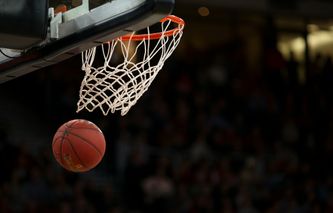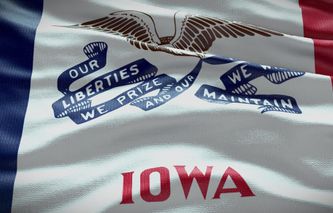First Game Played March 21, 1998
311 Superior St., Suite, 444 Chicago, IL 60610
Tel. (312) 705-7200
http://www.chicago-fire.com

Historical Moments:
1998: The Fire opened their inaugural season with a 2-0 win at Lockhart Stadium against Miami on March 21. Fifteen days later, the Fire would win their home opener against Tampa Bay, 2-0 in front of 36,444 vociferous fans at Soldier Field. Among the stars was Polish star, Peter Nowak. Spurred by a midseason 11-game winning streak, the Fire would go on to finish second in the Western Conference with a solid 20-12 record. In the playoffs, the Fire would continue their winning ways, narrowly edging the defending Western Conference champions Colorado Rapids. In the next round, the Fire went up against the best team in the league, the LA Galaxy. In the first game at the Rose Bowl, the Fire would squeak out a 1-0 win by a Jesse Marsch goal in the 87th minute. Then back home, one week later, the Fire would send the Galaxy packing by beating them in a shootout and advance to MLS Cup.
1998 MLS Cup: The Fire would travel back to the Rose Bowl, but this time, not to face the Galaxy. They were to meet the only champion MLS had ever known in its two-year existence: DC United. Two goals in the first half by Jerzy Podbrozny and Henry Guttierez were all the Fire needed as their steady goalkeeper, Zach Thornton kept United at bay to preserve a 2-0 victory and give MLS a new champion. For assisting on the two goals, Peter Nowak received MVP honors. Later on, they would complete the “double” by winning the US Open Cup. They became only the second team in MLS to manage that.
1999: Coming off a surprise championship in their first year in existence, the Fire were looking to build on it. At the end of April, they were on top of the Western Conference but slowly slid into the middle of the pack. At the end of the season, the Fire would clinch third place in the West for their second straight playoff berth with a mediocre 18-14 record. In the playoffs, though, they would lose their best-of-three series to the Dallas Burn, 2-1.
2000: With the acquisition of the “Mad Bulgarian,” Hristo Stoicthkov, the Fire were looking for a return to MLS Cup. Now in the Central Division, courtesy of realignment, there was no stopping them as they charged their way to the division championship with a solid 17-9-6 record and a second seed. In the playoffs, which had become a first-to-five point system, meaning three for a win and one for a tie, the Fire defeated the New England Revolution six points to three. They would go on to take care of the upstart MetroStars six points to three as Ante Razov scored a goal in the 88th minute to break a tie and return his team to MLS Cup.
2000 MLS Cup: In an MLS Cup First, the league’s best offensive team, the Fire met the league’s best defensive team, the Kansas City Wizards at RFK Stadium in Washington, DC. The Wizards’ Miklos Molnar would score in the 11th minute. From that point on, the Fire did everything in their power to pull even, but despite outshooting the Wizards, 22-6, they could not beat steaming goalkeeper Tony Meola as the Wizards walked away with the championship, 1-0.
2001: Once again, the Fire would be strong all year, finishing with a record of 16-6-5 in a season that was left without the final weekend due to the September 11 attacks on America. In the playoffs, the 2nd seeded Fire would eliminate the Dallas Burn in three games, 7 points to 1. In the next round, the Fire would take on the LA Galaxy, and the series started with a tie in LA. In Chicago, the Galaxy won in overtime and then finished off the Fire in OT again in game 3.
2002: As a result of contraction, the Fire would shift over to the Eastern Conference. But that wasn’t the big move. With Soldier Field going through a facelift, the Fire would move to Cardinal Stadium in Naperville, Illinois, where they would play for two seasons. Despite the temporary move, the Fire maintained their consistency, finishing with a record of 11-13-4 to clinch a playoff berth as the 7th seed. In the playoffs, they would go up against the resurgent New England Revolution. The Fire would fall in the first game but would rebound to win the second game. In the end, the Revs were too hot to handle, knocking the Fire out of the playoffs with a 2-0 result in game 3. After the season, head coach Bob Bradley, who had been with the team since its inception, resigned to take the coaching position with the MetroStars.
2003: In a season that would see a return to the brand new Soldier Field near the end of the regular season, the Fire again dominates the Eastern Conference, winning the conference title and the Best team in MLS with a solid record of 15-7-8. In the playoffs, which were now a home-and-home aggregate goal series, they would beat out DC United by not allowing them to score a single goal. In the semifinal, the Fire would get revenge on the New England Revolution, the team that beat them in the playoffs the previous year, in overtime on a goal by Chris Armas to advance to their third MLS Cup final.
2003 MLS Cup: The Fire would go up against the San Jose Earthquakes in Carson, California. The Fire would quickly fall behind on a fifth-minute goal by Ronnie Ekelund and a 38th-minute goal by Landon Donovan. The Fire kept in interesting with a goal in the second half by DaMarcus Beasley, but the Earthquakes eventually would come out on top, winning 4-2 in the highest-scoring MLS Cup game ever.
2004: In their first full season back at Soldier Field, the Fire would struggle out of the gate, winning only two games going into June. To add insult to injury, the Fire’s young star, DaMarcus Beasley, was transferred PSV Eindhoven in Holland in July. Despite that, the Fire would stay in playoff contention until the final weekend. But even when controlling their own destiny, the Fire was unable to take advantage of it as they lost 2-1 to the New England Revolution in their final game to miss the playoffs for the first time with a horrible 8-13-9 record.
2005: In their final season at Soldier Field before moving into their own soccer-specific stadium, the Fire would get off to a solid start, winning 7 of their first 13 games before making a run for first place with a five-game winning streak. The Fire continued their winning ways through the rest of the season, finishing in third place with a record of 15-13-4. In the playoffs, the Fire would go up against defending champions DC United and would make quick work of them, shutting them out 4-0 in the series. At Gillette Stadium in Foxboro, the Fire fell behind to the New England Revolution in the Conference Final, 1-0. Near the very end of the match, the Fire thought they had tied the score when Gonzalo Segares slotted the ball past Matt Reis, but the goal was not allowed as he was offside during the play. So there would be no saving the Fire as the 1-0 score held up.
2006: Following a mediocre start to the season in which they played every game on the road, the Fire finally christened their new stadium, Toyota Park, in Bridgeview on June 11. The Fire held a 3-1 lead against the New England Revolution going into the final minute, but the Revs would score two quick goals in stoppage time to spoil the party. The new home would provide a struggle for the team as they had a mediocre record there in the first year. The Fire would use a 6-2 September to return to the playoffs with a third-place record of 13-11-8. In the playoffs, the Fire would meet up again with the Revolution, looking for revenge for the playoff debacle the year before. Justin Mapp would score the first goal to give Chicago a 1-0 lead going to the second game. There, Nate Jaqua scored to make a two-goal cushion for the team. But Taylor Twellman and Pat Noonan would bring the Revs back. In the subsequent penalty shootout, the Revolution would outscore the Fire, 4-2.
2007: In an effort to return to the class of the league after a winless May, the Fire released Dave Sarachan as coach and replaced him with Juan Carlos Osario in early July and then focused their attention to their on-field product. Among the big-name acquisitions for the team were 34-year-old Mexican sensation Cuauhtemoc Blanco and Costa Rican World Cup veteran Paulo Wanchope. The moves brought a somewhat positive spark to the Fire, sneaking into third place in the East with an even record of 10-10-10. The Fire met their nemesis, DC United in the first round, and barely held them off, 3-2 in aggregate. But they would again be put out by the Revolution in the conference final on a breathtaking bicycle kick goal by Taylor Twellman that led to a 1-0 loss in New England.
2008: After losing in the semifinals, the Fire looked to improve by picking up Tomasz Frankowski and Líder Mármol. However, neither played a significant role in the Fire and spent a bulk of their time on the bench. The key to success for the Fire focused on goal as John Busch had a terrific season and was named Goalkeeper of the Year, as the Fire posted a solid record of 13-10-7. In the playoffs after a scoreless tie in Game 1, the Fire ripped through the New England Revolution in Game 2, winning 3-0 and the series on the aggregate. In the semifinals, the Fire would flicker out again, as they were beaten by the Columbus Crew 2-1.
2009: Building on momentum from the previous year’s playoffs, the Fire would open the season on an 11-match unbeaten run, which included five straight ties. In addition, the club would march to the championship of the SuperLiga tournament, losing to UNAL Tigres of Mexico in penalty kicks. A late-season slump cost the Fire first place as they settled for second place in the East with an 11-7-12 record. In the playoffs, the Fire defeated their nemesis the New England Revolution 3-2 on aggregate but lost in the conference final to Real Salt Lake 3-2 on penalties after a scoreless match.
2010: After another conference final loss, the Fire were determined to get over the hump. They enlisted the help of Mexican Carlos de Los Cobos to help them. A mediocre April and a winless May didn’t help their cause as they entered the World Cup break in fifth place and finished the season out of the playoffs at 9-12-9.
2011: At the start, the Fire would have a difficult time catching up with the pack as they won only twice in their first 18 games while losing four and tying 12. Already out of the playoffs, the Fire would play better in the back half of the season, going on a 7-2-1 run to finish out the season in sixth place with a record of 9-9-16.
2012: The Fire would spend most of the first half of the season juggling numbers in all three columns of their record as they struggled to maintain consistency throughout the year. A 7-1 stretch through August and September helped the Fire to a fourth-place record of 17-11-6 to qualify for the East’s knockout game at home. But the home-field advantage did the Fire no good as the Houston Dynamo defeated them 2-1 behind two goals by Will Bruin.
2013: Early on, the Fire slogged out of the gate as they only won two of their first eleven matches. The trade of Mike Magee from LA Galaxy helped the Fire gain some traction, winning seven games over the summer and climbing back into playoff contention. After winning three in a row, the team had to win in the last game against the Red Bulls to make the playoffs but fell 5-2. The Fire finished with a record of 14-13-7 and 49 points but lost out to the Montreal Impact on goal differential.
2014: After narrowly losing out on the playoffs, the Fire brought in Frank Yallop to lead the club. But circumstances beyond his control such as injuries to Mike Magee and Patrick Nyarko as well as the retirement of Logan Pause doomed the Fire. At season’s end, Chicago finished in ninth in the East with a record of 6-10-18, a record for ties in a season that included a stretch of six straight.
2015: Following a difficult tie-filled campaign, this season would not be any better, and a 3-5-2 beginning was a harbinger of tough times. A four-game losing streak in June, later topped by a five-game losing streak in September, was the accentuation of a last-place 8-20-6 finish.
2016: Under new coach Veliko Paunovic, the Fire were in for another long season. Only one win in their first ten matches immediately doomed the club, and they failed to put together any meaningful stretch on their way to another last-place record of 7-17-10. Their lone win away from Bridgeview was a 3-0 result at Montreal on August 20, their first such win in two years.
2017: Following a pair of finishes in the East basement, the Fire looked to be on the rise with the signing of Bayern Munich star and World Cup winner Bastian Schweinsteiger in mid-March. With his insertion to the roster, the Fire became ignited as two separate four-game winning streaks, accompanied by three ties, led them to the top half of the conference. In the second half of the year, the Fire hit a slump, going 2-6-1 in the tail end of the summer, but they had done enough to clinch their first playoff spot in five years with a third-place record of 16-11-7. Although they had won nine in a row at home during the regular season, there was to be no home-field advantage in the Knockout Round, losing 4-0 to the New York Red Bulls.
2018: After reaching the playoffs for the first time in half a decade, the Fire had a tough time maintaining any meaningful traction as the club won only three of their first eleven matches. A five-game unbeaten run provided some hope, but a subsequent eight-game losing streak promptly doomed the Fire’s playoff hopes as they wound up next to last in the East with an 8-18-8 record. Bastian Schweinsteiger’s first full season with the club was not productive with just four goals, and Nemanja Nikolic’s 15 goals weren’t enough to help his side.
2019: With rumors of a move back to the city limits of Chicago swirling, the Fire couldn’t find their way to start as they won only two of their first nine matches and could only watch as their competition buried them in the standings. It would get worse in the summer with only one win between May and July to go with two separate multiple-game winless streaks being their nail in the coffin. There would be better play at the end of the season with a five-game unbeaten run, but it was too late as they ended up eighth place in the East at 10-12-12, three points in back of New England for the last playoff spot.
Championship Teams
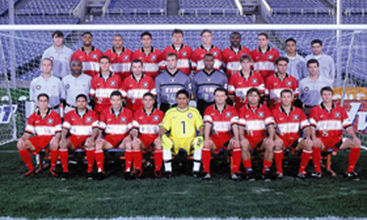 1998 MLS Cup Champions Chicago Fire |
Fire Stadiums
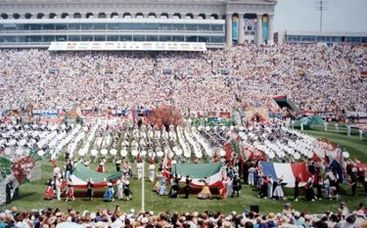 Soldier Field 1998-2001 | 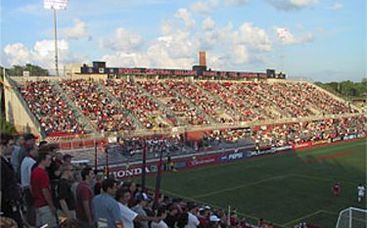 Cardinal Stadium 2002-2003 |
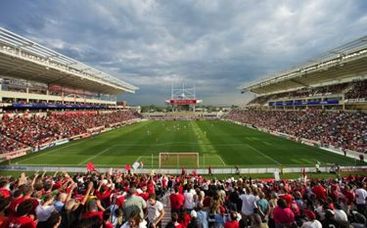 Toyota Park 2006-2019 | 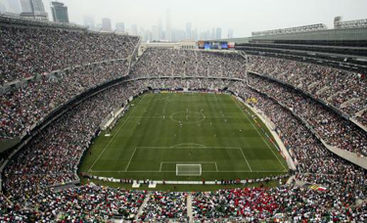 Soldier Field II 2003-2006, 2020-Present |
Legends of the Fire
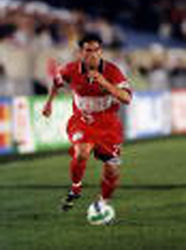 Zach Ibsen 1998 | 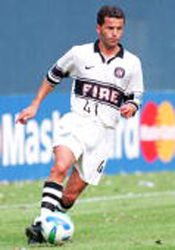 Frank Klopas 1998-1999 | 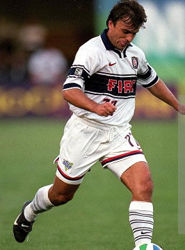 Roman Kosecki 1998-1999 | 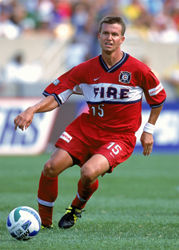 Richie Kotschau 1998-1999 | 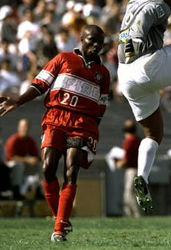 Francis Okaroh 1998-1999 |
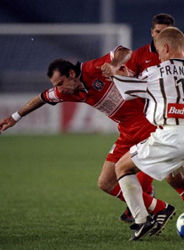 Jerzy Podbrozny 1998-1999 | 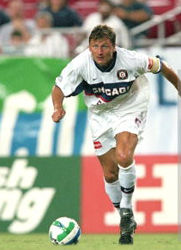 Lubos Kubik 1998-2000 1998 Defender of the Year | 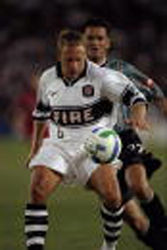 Tom Soehn 1998-2000 | 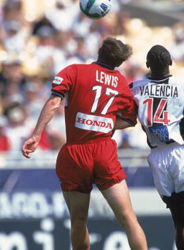 Andrew Lewis 1998-2001 | 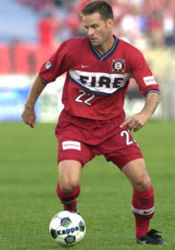 Andrew Lewis 1998-2001 |
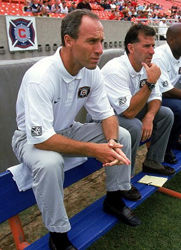 Bob Bradley Coach 1998-2002 | 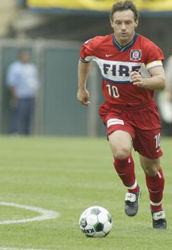 Pete Nowak 1998-2002 1998 MLS Cup MVP | 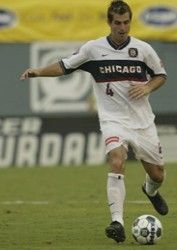 Carlos Bocanegra 2000 Rookie of the Year 2002 & 2003 Def. of the Year | 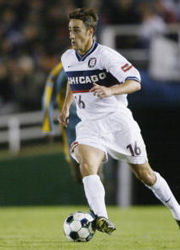 Josh Wolff 1998-2002 | 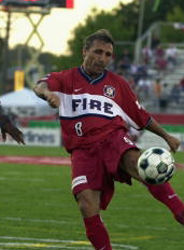 Hristo Stoichkov 2000-2002 |
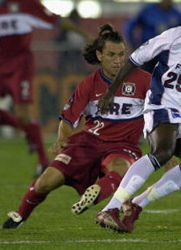 David Vauderuil 2001-2002 | 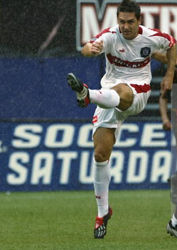 Ante Razov 1998-2000, 2001-2004 | 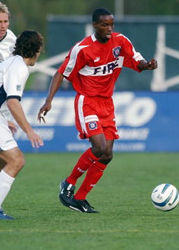 DeMarcus Beasley 2000-2004 | 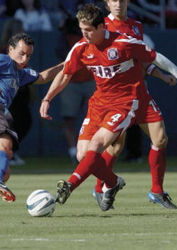 Carlos Bocanegra 2000-2004 | 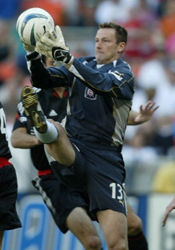 Henry Ring 2001-2004 |
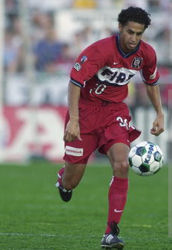 Orlando Perez 2002-2004 | 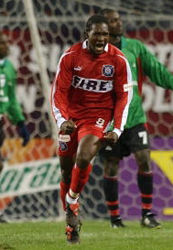 Damani Ralph 2003-2004 2003 Rookie of the Year | 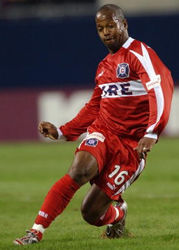 Andy Williams 2003-2004 | 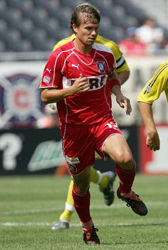 Jesse Marsch 1998-2005 | 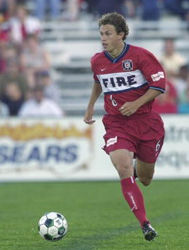 Kelly Gray 2002-2005 |
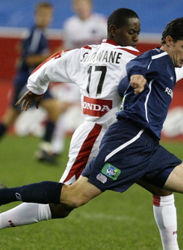 Dipsy Selolwane 2002-2005 | 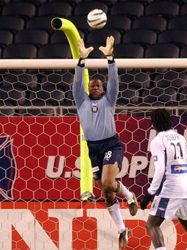 Zach Thornton 1998-2006 1998 Goalkeeper of the Year | 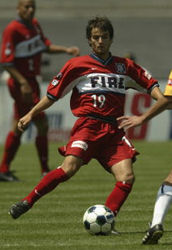 Craig Capano 2002-2006 | 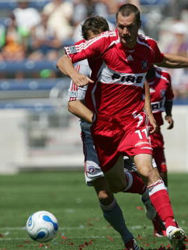 Nate Jaqua 2003-2006 | 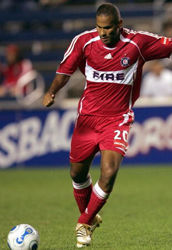 Tony Sanneh 2005-2006 |
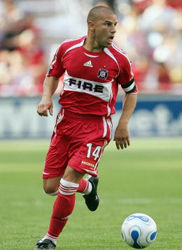 Chris Armas 1998-2007 | 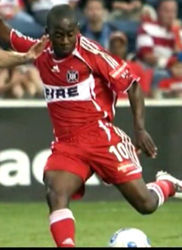 Thiago Correa 2004-2007 | 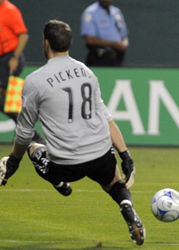 Matt Pickens 2004-2007 | 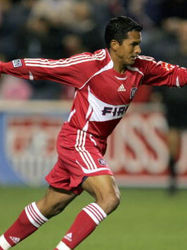 Ivan Guerrero 2005-2007 | 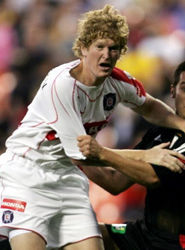 Jim Curtin 2001-2008 |
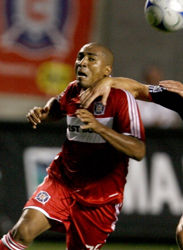 Andy Herron 2004-2006, 2008 | 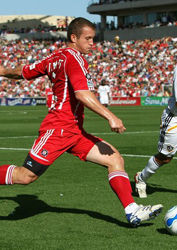 Chad Barrett 2005-2008 | 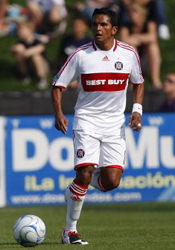 Diego Guiterrez 1998-2001, 2006-2008 | 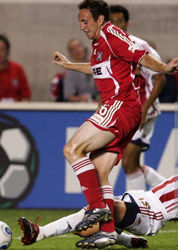 Brian Plotkin 2006-2008 | 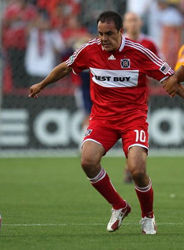 Cuauhtemoc Blanco 2007-2009 |
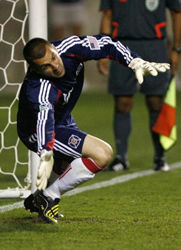 Joe Busch 2007-2009 2008 Goalkeeper of the Year | 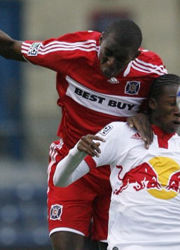 Bakary Soumare 2007-2009 | 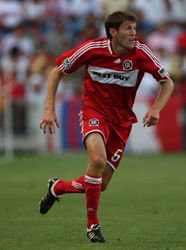 Brandon Prideaux 2008-2009 | 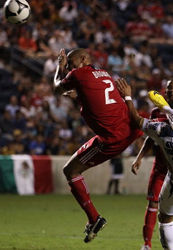 C.J. Brown 1998-2010 | 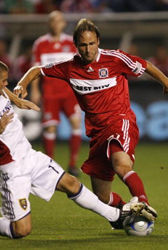 Justin Mapp 2003-2010 |
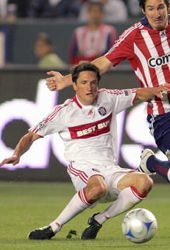 John Thorrington 2005-2010 | 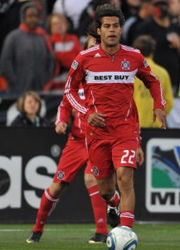 Wilman Conde 2007-2010 | 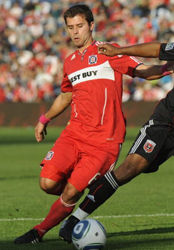 Peter Lowry 2008-2010 | 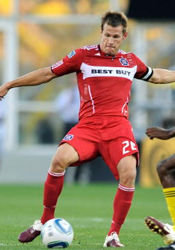 Brian McBride 2008-2010 | 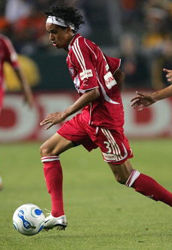 Calen Carr 2006-2011 |
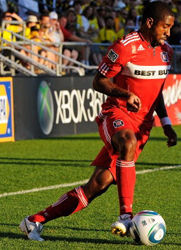 Dasan Robinson 2006-2011 | 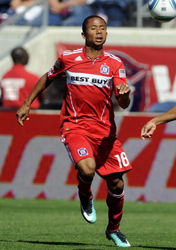 Dasan Robinson 2006-2011 | 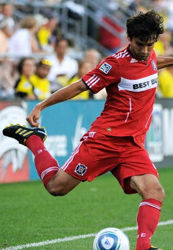 Baggio Husidic 2009-2011 | 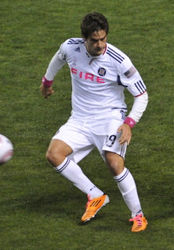 Diego Chaves 2011 | 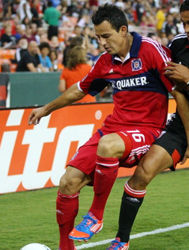 Marco Pappa 2010-2012 |
 Dan Gargan 2011-2012 | 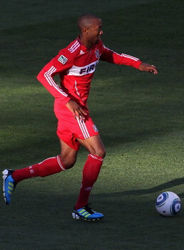 Cory Gibbs 2011-2012 | 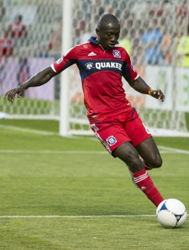 Dominic Oduro 2011-2012 | 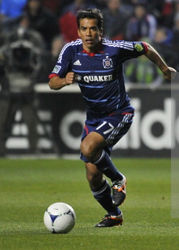 Pavel Pardo 2011-2012 | 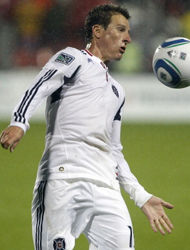 Corben Bone 2010-2013 |
 Jalil Anibaba 2011-2013 | 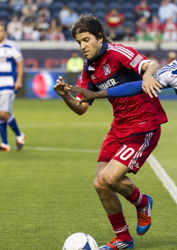 Sebastian Grazzini 2011-2013 | 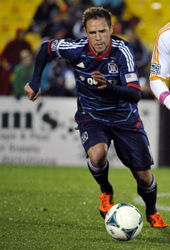 Daniel Palidini 2011-2013 | 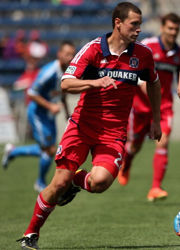 Austin Berry 2012-2013 2012 Rookie of the Year | 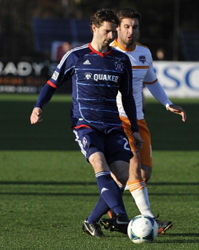 Arne Friedrich 2012-2013 |
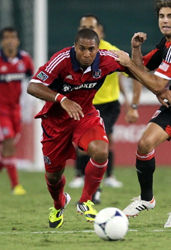 Sherjill MacDonald 2012-2013 | 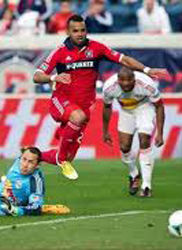 Maicon Santos 2013 | 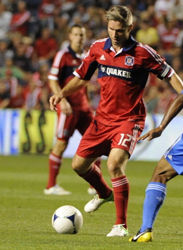 Logan Pause 2003-2014 | 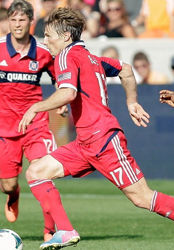 Chris Rolfe 2005- 2009, 2012-2014 | 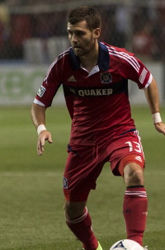 Gonzalo Segares 2005-2014 |
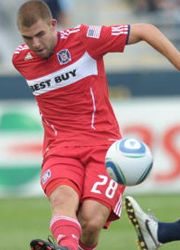 Steven Kinney 2010-2014 | 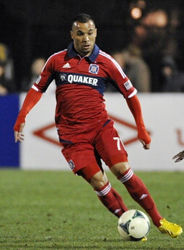 Alex 2012-2014 | 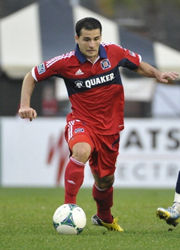 Dilly Duka 2013-2014 | 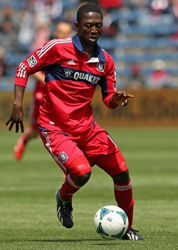 Patrick Nyarko 2008-2015 | 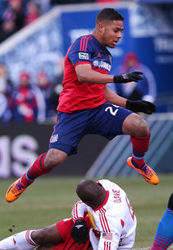 Quincy Amarikwa 2013-2015 |
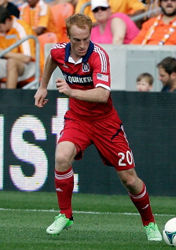 Jeff Larentowicz 2013-2015 | 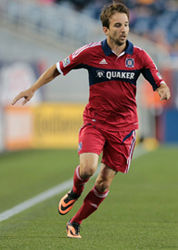 Mike Magee 2013-2015 2013 MLS MVP | 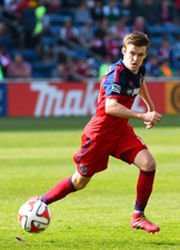 Greg Cochrane 2014-2015 | 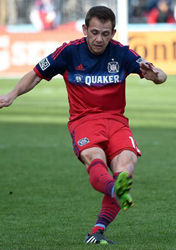 Harry Shipp 2014-2015 | 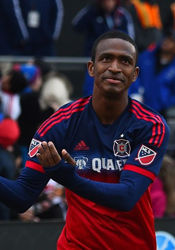 Adailton 2015 |
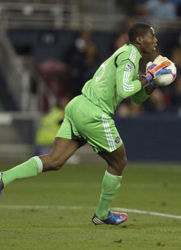 Sean Johnson 2010-2016 | 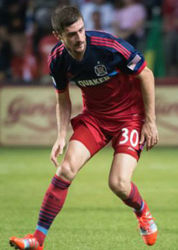 Razvan Cocis 2014-2016 | 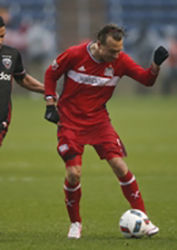 Gilberto 2015-2016 | 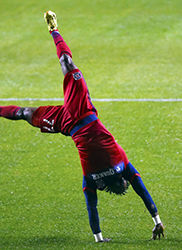 Kennedy Igboananike 2015-2016 | 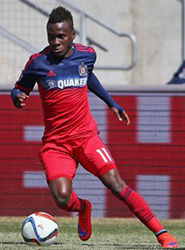 David Accam 2015-2017 |
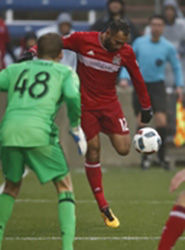 Arturo Alvarez 2016-2017 | 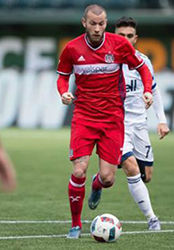 John Goossens 2016-2017 | 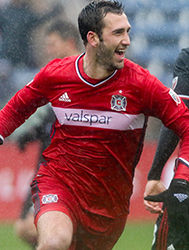 Michael Harrington 2016-2017 | 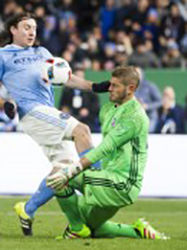 Matt Lampson 2016-2017 | 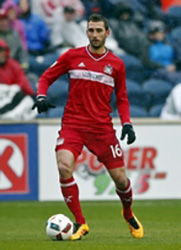 Jonathan Campbell 2016-2018 |
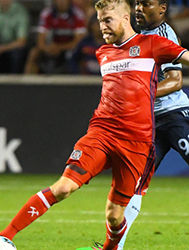 Michael de Leeuw 2016-2018 | 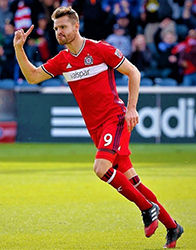 Luis Solignac 2016-2018 | 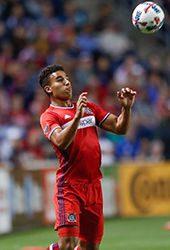 Brandon Vincent 2016-2018 | 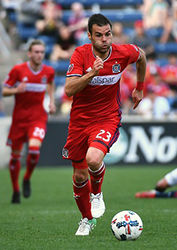 Nemanja Nikolic 2016-2019 2017 Golden Boot | 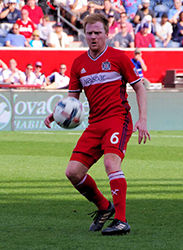 Dax McCarty 2017-2019 |
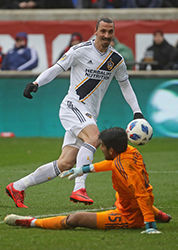 Richard Sanchez 2017-2019 | 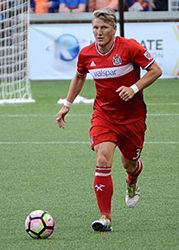 Richard Sanchez 2017-2019 | 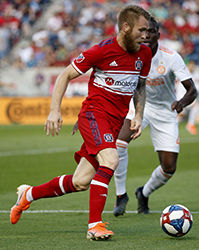 Aleksander Katai 2018-2019 | 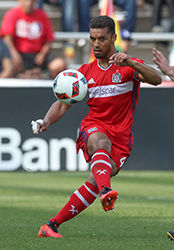 Jonathan Keppelhof 2016-Present | 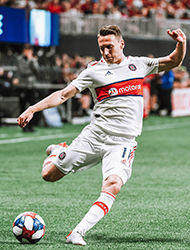 Przemysław Frankowski 2019-Present |
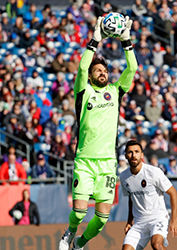 Kenneth Kronholm 2019-Present | 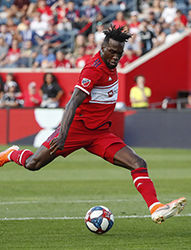 C.J. Sapong 2019-Present | 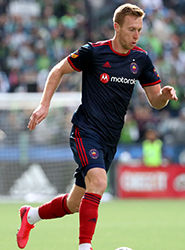 C.J. Sapong 2019-Present |
